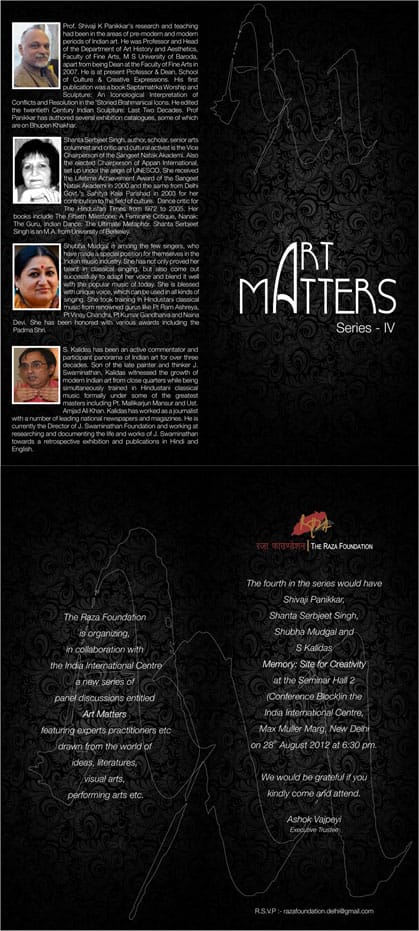
21-Aug-2012 12:00 AM
2727
The contemporary times stand witness to a constant deterioration of meaning of art and manipulation of theoretical social and political concepts as well as their practical significance. Whether they are questions as serious as social and political concerns of human rights or social exclusion affecting a dignified human survival, or as sensitive as the waning of interest in classical art forms, they call for an urgent need to revisit and discuss the prevalent conceptions.
Art has its unique way of reviving our soul from deadening monotonous routines through its multiple intricate expressions. Forming a singular perception of art or attributing a definitive meaning to it often reduces art from its fascinating complexity and expressive charm. This reductive approach confines art to its modernist understanding, which then fails to take cognizance of the artistic abstraction expressed through different forms and styles.
The Raza Foundation through its series ‘Art Matters’ provides a platform for open discussion on such issues. It endeavors not only to release the true essence of art from the clutches of definitive modernist approach in order to grasp myriad ways of extolling art, but also to stir up debate on the changing meanings of social and political theoretical concepts like rights, justice, liberty, citizenship, etc. Well known, renowned scholars and practitioners from all the diverse fields of arts, dance, music, social science, poetry, and so on are invited for this purpose.
Here, we publish the fourth panel discussion of ‘Art Matters’, titled ‘Memory: Site for Creativity’ featuring Prof. Shivaji Panikkar, Shanta Serbjeet Singh, Shubha Mudgal and S. Kalidas.
Prof. Shivaji Panikkar, a graduate in Economics (1976, Kerala University), B.Mus (1984, Bharatanatyam, M.S University of Baroda), M.A. (Fine) and Ph.D. in Art History (1980 and 1989, M.S.University of Baroda) Prof. Panikkar’s research and teaching had been in the areas of pre-modern and modern periods of Indian art. He was Professor and Head of the Department of Art History and Aesthetics, Faculty of Fine Arts, M.S. University of Baroda, for seven years from 2001, apart from being Dean at the Faculty of Fine Arts in 2007. He had initiated and implemented a revised syllabi, and course structure for BVA and MVA Art History courses from 2004 and from 2005 he was the Coordinator, UGC-ASIHSS Programme, in the same Department. He did his Ph.D. thesis under the guidance of Prof Ratan Parimoo and was on Sapta Matrka Workshop and Sculptures, and it was published as a book Saptamatrka Worship and Sculpture: An Iconological Interpretation of Conflicts and Resolution in the ‘Storied’ Brahmanical Icons, (D.K. Printworld (P) Ltd., New Delhi, 1997).
Shanta Serbjeet Sigh is a veteran columnist, critic and media analyst. She is the elected Chairperson of APPAN (The Asia-Pacific Performing Arts Network, set up under the aegis of UNESCO). She is the founder-Secretary of The World Culture Forum-India, and Director of WCF-India’s first Global Forum in India in October-November 2008.
Shubha Mudgal is an Indian singer of Hindustani classical music. Her repertoire includes several genres of Khayal, Dadra and Thumri. She is also involved as a singer in Indian popular music. She actually started performing as a Hindustani classical singer right from 1980s. She gained the reputation of an extremely talented singer from the outset. In the 1990s, she started her experiments with different forms of music which included pop and fusion. She has been involved in promoting music as a part of education curriculum in India.
The event was organised at the Indian International Centre on 28th of August 2012.